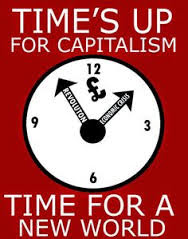For a society to be class-free it would mean no group (with the exception, perhaps, of temporary delegated bodies, freely elected by the community and subject always to recall) which would exercise, as a group, any special control over the instruments of production; and no group receiving, as a group, preferential privileges. Every member is in a position to take part, on equal terms with every other member, in deciding how the means of production should be used. Every member of society is socially equal, standing in exactly the same relationship to the means of production as every other member. Similarly, every member of society has access to the fruits of production on an equitable footing.
Once the use of the means of production is under the democratic control of all members of society, class ownership has been abolished. The means of production can still be said to belong to those who control and benefit from their use, in this case to the whole population organised on a democratic basis, and so to be commonly owned. It means a situation where no person is excluded from the possibility of controlling, using and managing the means of production, distribution and consumption. Each member of society has the opportunity to realise a variety of goals, for example, to consume what they want, to use means of production for the purposes of socially necessary or unnecessary work, to administer production and distribution, to plan to allocate resources and to make decisions about short term and long term collective goals. Common ownership refers to every individual’s ability to benefit from the wealth of society and to participate in its running.
The transfer of the power to control the production of wealth to all of society makes the very concept of property redundant. With common ownership the concept of property in the sense of exclusive possession is meaningless: no one is excluded, and there are no non-owners.
Common ownership is not to be confused with state ownership, since an organ of coercion, or state, has no place in socialism. A class society is a society with a state because sectional control over the means of production and the exclusion of the rest of the population cannot be asserted without coercion, and so without a special organ to exercise this coercion. On the other hand, a classless society is a stateless society because such an organ of coercion becomes unnecessary as soon as all members of society stand in the same relationship with regard to the control of the use of the means of production. The existence of a state as an instrument of class political control and coercion is quite incompatible with the existence of the social relationship of common ownership. State ownership is a form of exclusive property ownership which implies a social relationship which is totally different from socialism.
State ownership presupposes the existence of a government machine, a legal system, armed forces and the other features of an institutionalised organ of coercion. State-owned means of production belong to an institution which confronts the members of society, coerces them and dominates them, both as individuals and as a collectivity.
Under state ownership the answer to the question “who owns the means of production?” is not “everybody” or “nobody” as with common ownership; it is “the state”. In other words, when a state owns the means of production, the members of society remain non-owners, excluded from control. Both legally and socially, the means of production belong not to them, but to the state, which stands as an independent power between them and the means of production.
The state is not an abstraction floating above society. It is a social institution, and, as such, a section of society, organised in a particular way. For wherever there is a state, there is always a group of human beings who stand in a different relationship to it from most members of society: not as the dominated, nor as the excluded, but as the dominators and the excluders. Under state ownership, this group controls the use of the means of production to the exclusion of the other members of society. In this sense, it owns the means of production, whether or not this is formally and legally recognised.
Another reason why state ownership and socialism are incompatible is that the state is a national institution that exercises political control over a limited geographical area.
Since capitalism is a world system, the complete state ownership of the means of production within a given political area cannot represent the abolition of capitalism, even within that area. What it does mean is the establishment of some form of state capitalism whose internal mode of operation is conditioned by the fact that it has to compete in a world market context against other capitals.
Since today capitalism is worldwide, the society which replaces capitalism can only be worldwide. The only socialism possible today is world socialism. No more than capitalism can socialism exist in one country. So the common ownership of socialism is the common ownership of the world, of its natural and industrial resources, by the whole of humanity.
Socialism can only be a universal society in which all that is in and on the Earth has become the common heritage of all humankind, and in which the division of the world into states has given way to a world without frontiers with a democratic world administration as well as local and regional democracy.


.jpg)



